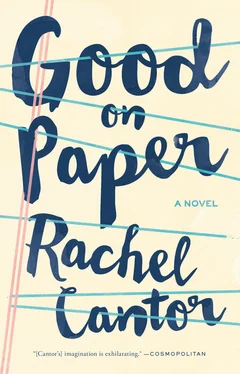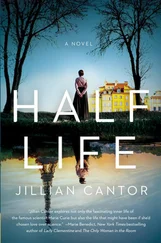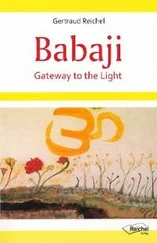A poem that comes close to announcing Romei’s poetics of distance and incomprehension includes an outrageous scrambling of the Celan line I’d featured in my story, written here not in German but in what I guessed was Yiddish: Then, when only nothingness stood between us, nothing brought us together .
To make clear the poet’s identification with this poem, he writes it as an acrostic, each line beginning with a letter from his name: R-O-M-E-I.
A pattern emerges, the couple’s version of normalcy. Esther takes typing lessons from an expatriate Scot, finds work in English-speaking offices, but always she is forced by drowsiness, by ever-shifting aches and pains, whose fluidity and unpredictability torment her more than their effects, to quit these jobs, though Romei suspects it’s the daily demands — the clothes that must be pressed, the long journeys by tram or bus — that wear her down. A disbarred doctor offers her a diagnosis over wine — hysteria, of the Freudian variety, he says, and suggests sex with a vigorous man.
The couple develops friendships with other marginalized types — a surrealist painter displaced by the Spanish Civil War, a schizophrenic actor, a heroin-addicted banker who leaves gold coins in Esther’s underwear drawer. Homosexual brothers: black dancers from Georgia. An amateur archeologist from Duquesne, in search of an underage wife. Esther types, the two attend parties, drinking fests in public places, Romei writes.
And thus, the years pass: Romei publishes a book of poems, and another. Esther dresses in men’s clothing, wanders late at night. Romei’s work is translated, he travels to consult with translators and publishers, leaving Esther in the custody of a friend, a poverty-stricken academic, a costume designer, an art restorer who can be relied upon to buy toilet paper and make polenta. Daily life is marked less by hysteria, more by courtesies, occasional kindnesses that betray the fullness of their resignation. Their intercourse is defined by what they do not discuss: Esther’s loss, the choice they did not make, which was to be together.
With extraordinary timing, Andi pulled on my sleeve.
Hello, my darling, I said, reaching for her shoulder.
You look funny, Mom.
Moms do that sometimes. You having fun?
Have you been reading my Notebook? she asked, squinting at me.
Never! I would never read your notebook! Your notebook is private!
I’m just asking.
I couldn’t help adding: You could share it with me sometime if you wanted.
Andi rolled her eyes. Good thing we brought Band-Aids, she said, pointing to a scrape I couldn’t see. I kissed her knee, once, twice, thrice, and held her tight.
It’s okay, Mambo! she said, pulling away. No need to go bananas!
I watched her run away, sans Band-Aid, watched the glimmering Hudson, and awaited my share of wisdom. These pages were no gift to Esther. To invert Dante’s poetics of praise, Romei had spared her nothing — he’d stripped her bare, exposed her as an hysterical, nymphomaniacal, cross-dressing hypochondriac. He dug his penna into her pain — her tears now the ink that filled his pen — and to what end? So he could play the martyr? What purpose could he have but injury? The modern meaning of libello , Dante’s “little book,” was libel. How could she bear to read this defamation? I felt a traitor’s desire to soften the language, to protect Esther from Romei’s vituperation. But I couldn’t. Who was I? The translator. I was no one.
38. ALWAYS WE RETURN TO DANTE

The next morning I awoke late. A note from Ahmad advised me that Andi was upstairs at Pammy’s. Again? Surely it was Pammy’s turn to come here, but I wouldn’t insist. Pammy was what Ahmad liked to call an expert : spinach makes you fat, childhood is incomplete without a parrot. My adulthood was complete without Pammy.
I visited the Flying Girl, who was in good form, flying over the head of the artist’s crazy mother. What was Romei doing? I asked. Did he hate his wife? What was his game? Would Ahmad move to Connecticut? What would Andi and I do then?
You’re pondering imponderables, the Flying Girl said. Go get lunch.
I got a hot dog from Cohn’s Cones’ beach menu, decided to take it for a walk — up Broadway, past Abdul’s, past the Eight Bar, then west to Riverside Drive, where I stopped at the Skating Park to watch mad young men turn upside down on their boards. I was heading to Grant’s Tomb, apparently, where Ahmad and I had walked every day when I was pregnant, talking about the future — how the world would begin again when she was born. We didn’t talk about the future these days; we didn’t talk about much of anything.
I was nearly at the Tomb when my phone rang.
Who is the child’s father? Romei asked. He didn’t say hello.
I beg your pardon?
Andray-a . Nice photograph, but who is the father?
You are unbelievable! I said. My daughter’s father is none of your business!
He is Ahmad from this last story you are writing? I like this story!
He was referring to “Domino,” the story about Jonah as a boy, the story that made Ahmad’s face go white, that made Jeanette stop talking to me.
Oh, I said. Well, thank you. But, no. Ahmad isn’t her father.
I found a bench facing the Hudson and sat down. In front of me, industrious, red-faced people jogged or roller-bladed along the Riverside Park path.
She looks like a good girl, Romei said, writing like her mother.
Yes, I admitted, looking for my MOM! handkerchief. She’s writing a story. About a boy at school.
She is loving this boy?
The thought made me laugh: like Dante loving Beatrice at her age. Was it so impossible?
She empathizes with him. He’s had a hard life. She confuses herself with him, maybe.
She is also having the hard life?
She thinks so … But that’s a long story.
I felt a strange urge to share with Romei the story of Connecticut, of Mirabella and Jonah, and all our hurts — he was so avuncular! Except he wasn’t, not really.
You too, maybe, are writing a story?
I am not writing a story. I’m working, like I said. Just working.
The muse is not with you? There is no fidanzato who inspire you?
I laughed and wiped Indian-summer sweat from my neck and brow.
Men may amuse me, I said, but they do not muse me.
This I cannot believe!
“Domino” was a bear, I said. The last story I ever wrote. I’ll probably never write again.
A bare ? You mean you hide nothing?
Bear, orso! I mean it was difficult. But, yes, it was also rather bare.
You do hide, if you refuse to be with a man.
You have too little knowledge of my life to make that judgment with, I said, too flustered to take care with my prepositions.
I mean you in the impersonal sense of one . This is the American way, no?
You don’t mean you in the impersonal sense, but I forgive you. Besides, if I hide, it’s no more than Dante does.
Always we return to Dante when we want to understand our life! Romei said.
Is that we in the royal we sense, the you-and-me we, or the impersonal we?
Wee, wee, wee! the poet cried. All the way home! This is American, no? A game played with the children’s feet?
Maybe it was Indian summer or the hotdog napkin still in my hand — a memory struck me, of little Shira on the beach, skin roasting, sodas warming nearby, bathing suit sticking like a reassuring second skin. Screaming with glee as someone, her mother, wee-wee-weed up her fat little thigh, little Shira laughing till she wee-wee-weed in reply. And my mother, smiling a sun-kissed smile, calling me babydoll and, caking my legs with sand, picking me up and running me to the sea. I couldn’t have been more than two. Baby Shira laughing with her mother? Was it possible?
Читать дальше













